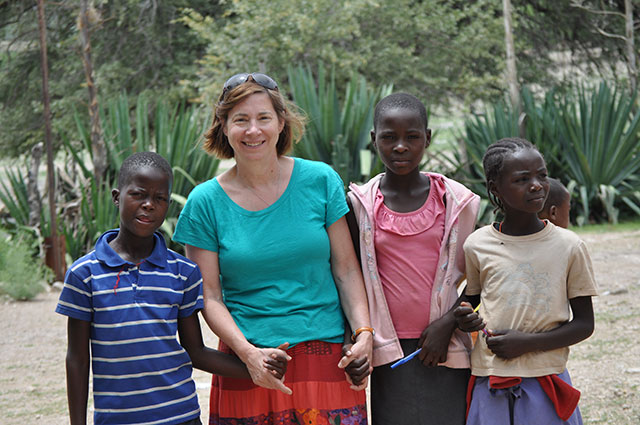Page 279 • (4,126 results in 0.05 seconds)
-

August 20, 2013 PLU Professor Jan Weiss in Namibia. One on One: Jan Weiss By Barbara Clements A 22-year-old Jan Weiss walked into the elementary school southeast of Portland, Ore., and looked at her third-grade class. Twenty-five faces looked back. And Weiss realized that she knew nothing about their world, nor they, hers. Weiss grew up in a relatively prosperous home near San Jose, Calif., where dad was an engineer who worked on the Apollo and Gemini launches for a major aerospace company, and
-

: I have two majors, in environmental studies and theatre, and a minor in Hispanic studies. I’m also taking a PLUS Year. How do your majors interact with each other? Ruggeri: PLU’s liberal arts program really encourages us to connect our studies. You see great examples of political theater with “Hamilton,” for example. My political science and environmental studies inform how I create active political and social change with theatre. The storytelling lessons learned from theater help me share why
-

: I have two majors, in environmental studies and theatre, and a minor in Hispanic studies. I’m also taking a PLUS Year. How do your majors interact with each other? Ruggeri: PLU’s liberal arts program really encourages us to connect our studies. You see great examples of political theatre with “Hamilton,” for example. My political science and environmental studies inform how I create active political and social change with theatre. The storytelling lessons learned from theatre help me share why
-
: Executive Leadership Internship (1) Taken three times for a total of 3 credits Educational Leadership Strand – 18 semester hours EDUC 700: Educational/Instructional Leadership Orientation & Introduction (3) EDUC 731: Educational Leadership: Instructional Leadership (3) EDUC 732: Current Trends and Challenges in Educational Leadership (3) EDUC 760: Evaluation and Supervision in Educational Leadership (2) EDUC 761: Educational Leadership: Equity and Social Justice (3) EDUC 762: Educational Leadership
-
The PLU ExperiencePLU offers over 40 academic majors, 50 minors, and purposefully integrates professional studies with the liberal arts and sciences for a comprehensive education to successfully prepare students for “lives of thoughtful inquiry, service, leadership and care.”Who teaches you?All classes are taught by PLU professors, not teaching assistants, with an average class size of 21 students. Our professors are experts in their fields who care as much about who they are teaching as they
-

volunteers focus on cultivating global citizens in addition to promoting scholarship,” said Peace Corps Director Jody Olsen. “I am proud that so many graduates of these esteemed institutions leverage their educations to make the world a better place. They bring critical skills to communities around the world and gain hands-on, life-changing experience along the way.” *Note: All comments are moderated Read Previous Giving Back Through Graphics Read Next Senior Profiles: Class of 2019 Is Making a
-
, explore academics and enjoy the PLU community as you make your decision about where you will go to college. *For admitted first-year students only. Register for Lute OverKnightExplore Academics Meet professors, sit in on a class (students only), learn more about the major(s) in which you’re interested and get a glimpse of academic life at PLU. Immerse yourself in the PLU community Spend the night on campus (students only), see student performances, get to know other students and discover what life is
-
life at the University Campus Safety and Information253.535.7441campussafety@plu.eduCampus parking, vehicle registration, and safety. Student Financial Services253.535.7134finaid@plu.eduGeneral financial aid assistance, veterans questions, Ramstad Commons253.535.7459aadv@plu.eduAcademic Advising, Academic Assistance, Academic Internships, Career Connections, and Student Employment. Registrar253.535.7131registrar@plu.eduTransfer credit evaluation, graduation, class schedules, grades and classroom
-
of CUNY that are located throughout the 5 boroughs of NYC for their thesis research. Students are mentored by world-class researchers and enjoy access to state of the art facilities and instrumentation at the campuses and in central and collaborative research buildings such as the Advanced Science Research Center or at the Belfer Building that is jointly operated with Weill-Cornell Medical Center. Students receive a guaranteed 5-year, $30,000 per year Science Scholarship, full tuition waiver, and
-
experimental and computational researchers, drawing on UNT’s world-class resources in both instrumentation and high-performance computing. Possible research areas include: Light-Harvesting Organic/Metal-Organic Materials * Computational Catalyst Design * Transition Metal Catalysis for Organic Synthesis * Electrochemical Characterization of Semiconductor Materials * Porous Materials for Environmental Remediation * Gas-Sensing Materials * Pharmacological Modeling of Illicit Substances * Organometallic
Do you have any feedback for us? If so, feel free to use our Feedback Form.


